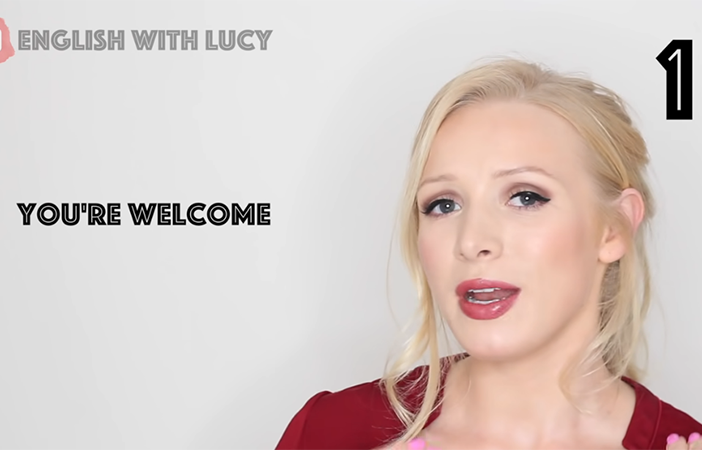
Thank you, thanks, cheers, ta, thanks a million.
There’s lots of different ways to thank somebody. But how do you respond?
In this post, we’ll look at different ways to say “you’re welcome”.
This blog post was inspired by English with Lucy, a very informative British English YouTube channel and her video Do NOT say “you’re welcome”. So without further ado, let’s see how we can vary our speech a little.
Most English language learners are taught “you’re welcome” as the correct response to “thank you.”
But, it’s definitely NOT the most common response.
Different Ways to Say “You are Welcome”
- It's alright.
- It was nothing.
- No worries.
- No problem.
- Not at all.
- I know you’d do the same for me.
- Don't mention it.
- The pleasure is mine.
- My pleasure.
- Pleasure.
- It was the least I could do.
- Thank you!
- I'm happy to help.
- Happy to help.
- Thank you for your business.
- Much obliged.
If you do a small gesture for someone, such as holding a door open, you’d be more likely to respond to their thanks with a “It’s alright.”
Pronunciation wise, you’d probably hear it as “s’alright.”
It’s a casual way of responding and is a perfectly valid way of acknowledging somebody’s thanks.
“No worries,” “no problem,” “don’t mention it” or “anytime” are four other ways you could respond here.
You could also say, “It was nothing.”
Again, in terms of pronunciation we’d probably skim over the first part and pronounce it something like “s’nothing.”
So, if it's just a small gesture, perhaps one you’ve done out of politeness for a stranger and will probably do again and again, one of these responses is just fine. The other person won’t be offended – in fact, it’s more important that they say thank you!
If it was a slightly more meaningful gesture, you could respond with “The pleasure is mine”, “My pleasure”, or even just “Pleasure”.
You could also say “I know you’d do the same for me,” or “It was the least I could do.”
These are all ways of responding to a bigger gesture, a favor, or perhaps a gift to acknowledge that you really do appreciate their thanks, and that you did the gesture with feeling too.
Sometimes, you might respond to a “Thank you” with “Thank you.”
This time, you’d really emphasize the “you.” This would be when somebody thanks you, but actually you think they deserve the thanks!
Formal Situations
In more formal situations, for example in business, you could use “Much obliged.”
This is quite old-fashioned now, and you won’t hear it much. It means that you were happy to help. It also kind of means thank you and that you were happy to help.
At a Shop
If working in a shop, you could also say “I’m happy to help” or just “Happy to help”.
You could also say, “Thank you for your business.”

Sarcasm
One important note to end, if you say “You’re welcome” or any of the above phrases before somebody thanks you, then it sounds sarcastic and rude.
In some foreign languages, the word which is used to respond to a thank you is also used to mean “Here you are” when giving the customer something.
“You’re welcome” is not used like this in English. So, just remember to wait for the “Thank you“ before saying you’re welcome!
Along that line, if you don’t thank somebody they might say “You’re welcome” sarcastically.
For example, if you gave a sibling some chocolate and they didn’t say “Thanks,” then you’d probably respond with a “You’re welcome” or “No problem” in a flat, monotonous voice.
Wrap up
So, there you have it!
Lots of different ways to respond to a thank you, including sarcasm if you need it.
For the next few days, challenge yourself not to say, “You’re welcome.” See how many of the phrases you can use.
Thanks again go to English with Lucy’s YouTube channel. Make sure you check it out to hear the pronunciation of the phrases.



Add your first comment to this post